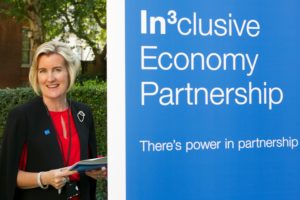The importance of effective partnerships for inclusive growth
“The spirit of the Inclusive Economy Partnership is about generosity - generosity of time, ideas and support. Our purpose is creating a society we’re proud to pass on to our children. And the only way we’ll do that is by building a new kind of inclusive economy.” - Sacha Romanovich, CEO of Grant Thornton and Co-chair of the IEP
The importance of effective partnerships for inclusive growth
My work within the Cabinet Office, as head of Business Partnerships, brings me face to face with these themes, highlighted by Sacha, on a daily basis.
Over the last year or so, my team and I have worked hard to develop a model that builds on this belief and has the potential to create inclusive growth, as there’s really nothing more worthwhile for our country than to have all its citizens actively engaged in our economy and society.
This innovative model is known as the Inclusive Economy Partnership (IEP). The IEP programme, funded jointly by the Cabinet Office and DCMS, brings business, civil society organisations and the public sector together to tackle three main areas: mental health in the workplace, transition to work for young people and financial inclusion and capability.
But what makes the IEP’s approach unique and innovative is the role that government has chosen to play. The partnership’s three challenge areas weren’t chosen by government alone but by consensus with the IEP’s business and civil society partners. This collaborative culture is underpinned by the ‘IEP Champions advisory board’, made up of seven corporate and seven civil society CEOs. This structure and our open approach allows us to draw upon
the collective knowledge of our partners and wider ecosystem.

Inclusive Economy Partnership
Early on in the IEP’s development, organisations we were working with had already realised the strength of purpose-led business, a step beyond the traditional CSR model. For the IEP this was important as it meant the partnership didn’t become a ‘talking shop’ for great ideas with very little impact on the ground. Aligning a business with an authentic higher purpose helps employees and leaders of an organisation find meaning in their work. This mindset has been a key driver behind the passion, energy, drive, and most importantly, the commitment to create a fairer society that we see with our IEP partners.
So what are we doing in practice? Since the IEP was formed in September 2017, we have been able to bring over 120 organisations together to work with 18 innovators to find and scale solutions to our three challenge areas.
One of our innovators, ‘Careers Advice for Parents’, has worked with Ernst and Young to deliver careers advice workshops to parents making it easier for young people to get the support and advice needed to improve their career prospects. Another, ‘Money A + E’, has collaborated with Grant Thornton on their financial literacy programme helping those stuck in financial difficulty get the advice needed to make the right decisions with their money. Similarly, ‘This is Me’, has been working with Landsec to expand their mental health programme in Leeds and Oxford, which looks to improve their employees’ mental wellbeing and thereby increase productivity.
We are also looking at alternative approaches to these huge challenge areas. One of our ‘big idea’ projects is a West Midlands pilot. This project has brought together UnLtd, Accenture, O2, Movement to Work, Youth Employment UK and the West Midlands Combined Authority to design a youth employment pilot in the region.
This is just a snapshot of some of the amazing work being carried out by the IEP and its grant-winning innovators. However, the success of the IEP cannot be measured by partnerships alone, but also by the impact the IEP has already had within society.
We’re just at the start of our journey, but it is brilliant to see the work of effective partnerships already starting to have an impact. If you have any questions about the IEP or if you want to support the government in building a more inclusive economy and society, please get in touch with us at iep@cabinetoffice.gov.uk.
Working on the IEP has shown me that the future for creating an inclusive and fairer society lies in the success of effective partnerships between business, civil society organisations and government. Without having this open and honest conversation across the three sectors it is near impossible to discover, stimulate and scale the changes needed to transform our society.
Leave a Reply
Leave a Reply